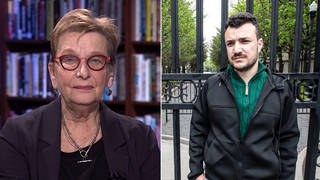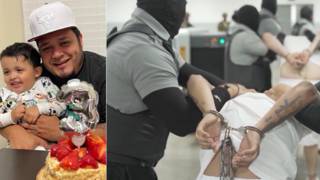
Guests
- Michael Ratnerpresident emeritus of the Center for Constitutional Rights and a lawyer to Julian Assange and WikiLeaks. He recently returned from attending part the pretrial hearing for Bradley Manning.
Links
Bradley Manning, the U.S. Army private accused of leaking hundreds of thousands of classified documents to the whistleblowing website WikiLeaks, has testified for the first time since he was arrested in May 2010. Speaking Thursday at a pretrial proceeding, Manning revealed the emotional tumult he experienced while imprisoned in Kuwait after his arrest in 2010, saying, “I remember thinking, ’I’m going to die.’ I thought I was going to die in a cage.” As part of his testimony, Manning stepped inside a life-sized chalk outline representing the six-by-eight-foot cell he was later held in at the Quantico base in Virginia, and recounted how he would tilt his head to see the reflection of a skylight through a tiny space in his cell door. Manning could face life in prison if convicted of the most serious of 22 counts against him. His trial is expected to begin in February. He has offered to plead guilty to a subset of charges that could potentially carry a maximum prison term of 16 years. “What’s remarkable is that he still has this incredible dignity after going through this,” says Michael Ratner, who was in the courtroom during Manning’s appearance. “But I think all these prison conditions were — sure, they were angry at Bradley Manning, but in the face of that psychiatric statement, that this guy shouldn’t be kept on suicide risk or POI, they’re still keeping him in inhuman conditions, you can only ask yourself — they’re trying to break him for some reason. The lawyer, David Coombs, has said it’s so that he can give evidence against Julian Assange and WikiLeaks.” Ratner is president emeritus of the Center for Constitutional Rights and a lawyer for Julian Assange and WikiLeaks. [includes rush transcript]
Transcript
JUAN GONZÁLEZ: Bradley Manning, the U.S. Army private accused of leaking hundreds of thousands of classified documents to the whistleblowing website WikiLeaks, has testified in a courtroom for the first time since he was arrested in May 2010. Speaking Thursday at a pretrial proceeding, Manning revealed the emotional tumult that he experienced while imprisoned in Kuwait after his arrest in 2010, saying, quote, “I remember thinking, ’I’m going to die.’ I thought I was going to die in a cage.”
As part of his testimony, Manning stepped inside a life-sized chalk outline representing the six-by-eight-foot cell he was later held in at the Quantico base in Virginia, and he recounted how he would tilt his head to see the reflection of a skylight through a tiny space in his cell door.
Manning could face life in prison if convicted of the most serious of 22 counts against him. His trial is expected to begin in February. He has offered to plead guilty to a subset of charges that could potentially carry a maximum prison term of 16 years.
On Thursday, Democracy Now! spoke about Manning’s case with WikiLeaks founder Julian Assange, who is currently residing inside the Ecuadorean embassy in London, where he sought refuge nearly six months ago.
JULIAN ASSANGE: What is happening this week is not the trial of Bradley Manning; what is happening this week is the trial of the U.S. military. This is Bradley Manning’s abuse case. Bradley Manning was arrested in Baghdad, shipped over and held for two months in extremely adverse conditions in Kuwait, shipped over to Quantico, Virginia, which is near the center of the U.S. intelligence complex, and held there for nine months, longer than any other prisoner in Quantico’s modern history. And there, he was subject to conditions that the U.N. special rapporteur, Juan Méndez, special rapporteur for torture, formally found amounted to torture.
There’s a question about who authorized that treatment. Why was that treatment placed on him for so long, when so many people—independent psychiatrists, military psychiatrists—complained about what was going on in extremely strong terms? His lawyer and support team say that he was being treated in that manner, in part, in order to coerce some kind of statement or false confession from him that would implicate WikiLeaks as an organization and me personally. And so, this is a matter that I am—personally have been embroiled in, that this young man’s treatment, regardless of whether he was our source or not, is directly as a result of an attempt to attack this organization by the United States military, to coerce this young man into providing evidence that could be used to more effectively attack us, and also serve as some kind of terrible disincentive for other potential whistleblowers from stepping forward.
AMY GOODMAN: That’s Julian Assange, founder and editor-in-chief of WikiLeaks, now under political asylum in Ecuador’s London embassy. He was speaking about Bradley Manning, the U.S. Army private accused of leaking hundreds of thousands of classified documents to Assange’s website, WikiLeaks. Manning testified Thursday at this pretrial proceeding for the first time since he was arrested more than two years ago.
For more. we’re joined by Michael Ratner. He’s president emeritus of the Center for Constitutional Rights, a lawyer for Julian Assange and WikiLeaks, and he just got back from attending the pretrial hearing of Bradley Manning yesterday at Fort Meade.
Michael, describe the scene in the courtroom.
MICHAEL RATNER: You know, it was one of the most dramatic courtroom scenes I’ve ever been in. I mean, for days we’ve been waiting to see whether Bradley Manning was going to testify, and it’s testimony about the conditions he was held in really for almost two years, but certainly the part in Kuwait and Quantico. And we didn’t have—we’ve seen him in the courtroom, but we didn’t see him ever take the stand. So we’re sitting in this small courtroom. There’s all of these guys in these formal-dress blue uniforms. I mean, they look like those Custers or Civil Wars with those little things on their shoulders, epaulets. And then, all of a sudden, we come back from lunch, and David Coombs, Bradley’s lawyer, says, “Bradley Manning will come to the stand.”
And you could have heard—I mean, the room was just mesmerized by what was going to happen next. And he says to Bradley, “I know you may be a little nervous about this. I’ll ease you into it.” When Bradley opened his mouth, he was not nervous. I mean, he was—the testimony was incredibly moving, emotional roller coaster for all of us, but particularly, obviously, for Bradley and what he went through. But it was so horrible what happened to him over a two-year period. But he described it in great detail in a way that was articulate, smart, self-aware. I mean, he knew what was going on. He tried to make it so that they wouldn’t keep him on the suicide risk, they wouldn’t keep him on preventive injury status, where he didn’t have clothes and all of that. And he couldn’t do it. And he kept trying it, and they kept lying to him. And it was really dramatic.
What came out—what it began with was really his arrest in late May of 2010. He was almost immediately taken to Kuwait. And that’s where—really where they got him in a way that really, for a period of time, almost destroyed him. They put him into cages that he described as eight-by-eight-by-eight. There were two cages. He said they were like animal cages. They were all—they were in a tent alone, just these two cages, side by side. One of them had whatever possessions he may have had; one of them, he was in, with a little bed for a rack and a toilet, dark, in this cage for almost two months. He was taken out for a short while and then, without explanation, put back in the cage, meals in the cage, etc., all of that.
And then—wait until you hear this. They would wake him at night at 11:00 p.m., 10:00 or 11:00, and his day—or night—was all night, and he was allowed to go back to sleep at 12:00 or 1:00, noon, the next day. So when we think about what happened to people at Guantánamo or sensory deprivation or what McCoy says in his books on torture, what are they trying to do except destroy this human being?
And he said, “For me, I stopped keeping track. I didn’t know whether night was day or day was night. And my world became very, very small. It became these cages. And I’m person,” he said—this was really, I thought—all of us really were interested in it. He said, “I’m someone who likes current events. I take a broader view of the world.” And he gave an example of the oil spill in the Gulf. And he said, you know, “When that ended,” and he said, “my world all of a sudden was totally confined to these cages.” And that was almost two months in Kuwait, something that none of us really knew about for this period. And he went on to talk about then what happens when he went to Quantico.
JUAN GONZÁLEZ: And Michael, you’re describing a person who was the exact opposite of some of the portraits of him that have come out from some supposed supporters of his, but also people who have had grudges against him, of being an unstable—an emotionally unstable person. The sense that you got of how intelligent and how clear he was about what was happening to him?
MICHAEL RATNER: Even one of the psychiatrists who testified and who was one of the psychiatrists who said this guy should never have been put on prevention of injury or suicide risk when he was at Quantico—that was right after Kuwait—said he’s highly intelligent. And you could see that. And the image was just at the—as you’re saying, Juan, was the opposite of what I would have thought going in there, of this sort of—of this person who couldn’t make their way in the world, of who just, you know, was unable to really function. This person was articulate, strong, self-aware, as I said, and it was—and very sympathetic. I mean, very sympathetic. And not even a shade that he shaded anything, not anything close to, you know, mendacity, lies, nothing. This was incredible testimony.
AMY GOODMAN: The psychiatrist who treated Bradley Manning while he was in prison at Quantico Marine brig testified on Wednesday that commanders there consistently ignored his medical advice and continued to impose harsh restrictions on Bradley Manning, even though he posed no risk of suicide. Captain William Hoctor said he treated prisoners at Guantánamo but had never encountered military officials so unwilling to heed his medical advice. He testified and said, “I had been a senior medical officer for 24 years at the time, and I had never experienced anything like this. It was clear to me they had made up their mind on a certain cause of action, and my recommendations had no impact,” he said. Michael Ratner?
MICHAEL RATNER: No, yesterday when I was in court, they put up another—they put another psychiatrist on, the defense did, Ricky Malone, who had been head of like—very substantial psychiatrist, head of Walter Reed at some point, in forensic psychology. And he said essentially the same thing. He said, “I went in there. I treated Bradley Manning. I gave him, you know, a sleep medication when he needed sleep. And I went to the person who ran that brig, and I kept saying he does not have to be on POI,” that’s short for preventive injury, “he doesn’t have to be on suicide risk watch.”
AMY GOODMAN: And explain what that means when he’s put on those.
MICHAEL RATNER: Right, I’m glad you asked that, because this was so dramatic. They showed a video at some point at the trial of what—of where Bradley Manning was kept. And he’s kept—there’s no natural light. If he presses his face to the screen—it’s not really bars, it’s like a square screen—he could see the reflection of light on the floor at the end of the hall. Immediately across from his cell is the observation booth that looks right into him, so even if he goes to the bathroom and sits on the toilet, they see everything he does. There’s a bright light on him—again, sensory stuff, if you look at that—24 hours a day.
They show in the video, when they—when they actually—something happens where they decide they’re going to put him—he’s always on POI, but they’re going to put him back on suicide risk. And they showed the video of—it’s videoed—of him passing his clothes through the mail, through the little hatch, out of the prison. And then, that—
AMY GOODMAN: Like a mail slot.
MICHAEL RATNER: Like a mail slot. And that night, he’s standing there stark naked. They only show you the top, but he’s standing there stark naked in front of these really beefy, big marines in camouflage. That’s the scene you see.
And then there’s another video showing, asking—he’s trying to ask, “Why am I here? What did I do wrong?” And they’re lying to him. One of them says—one of them, who’s—you know, who’s playing like Mutt and Jeff, he’s saying, “Well, you’re a great—if I had a hundred, you know, defendants like you—or prisoners like you, it would be—you know, I would be great.” They’re lying to him all the time.
And what comes out, because as that video—as that clip you read, Amy, of the psychiatrist, is that it never happens, really never happens, that the head of a brig disregards psychiatric information like they were given about Bradley Manning. And here they did. And so, the question you have to ask yourself is, where was that order coming from? We know there was a three-star general involved. How much did it go up to the Pentagon?
AMY GOODMAN: Who was the three-star general?
MICHAEL RATNER: I don’t remember his name.
AMY GOODMAN: And this is, of course, all under President Obama.
MICHAEL RATNER: Right. Right, that’s correct. I mean, this was—and that cell, when he’s in that cell—I mean, when we talk about the light on, when he sleeps on that little bunk and his—he’s facing—he has to face the light so they can observe him. If he turns over to avoid the light, they come in, and they wake him up. That’s night. Day—what happens during the day? He’s in that cell 23-and-a-half hours a day, maybe 20 minutes of what they call sunshine exercise, which is just nothing. And what can he do? Because he’s on duty, supposedly, he has to either stand or he can sit on that metal bunk with his feet on the ground and can’t lean against anything. That’s 10 or 15 hours a day of what you have to call sensory deprivation.
JUAN GONZÁLEZ: And Michael, I’d like to ask you about—given that he’s been under these conditions now for two-and-a-half years, it’s not surprising that he would be attempting to try to negotiate some kind of a plea deal on a reduced sentence. Could you talk about that part, that aspect of what happened with the court?
MICHAEL RATNER: Yeah, yeah. Let me back up on that for one second, because he was in Kuwait 'til end of July 2010. He then was taken to Quantico ’til April or so of 2011. That's the nine months that this hearing is really about and whether the charges should be dismissed because of the serious misconduct and torture and cruel treatment by the government.
So, then he was taken to Leavenworth. And just as an illustration of how he did not have to be treated like he was treated at Quantico, they put on the head of Leavenworth brig by telephone yesterday, and she said, “Well, as soon as he got here, he went right into medium security.” And that’s the best you can do when you’re pretrial. Then, you mix with the population. You get—you get all your hygiene items.
There’s a scene in this—in this—and he talks—where he has to actually beg for a piece of toilet paper. He has to stand in front—at Quantico, stand there with no shirt on, with his boxers, and said, whatever, “Corporal something, this is Corporal Manning, or Private First Class Manning, can I have a piece of toilet paper?” And he has to stand there at attention, while he’s begging for a piece of toilet paper.
Your question, Juan, what the lawyer has said, David Coombs, the lawyer for Bradley Manning, has said, they are trying to force Bradley Manning into testifying if he knows anything, which we—you know, probably falsely, because we don’t think there’s anything there—but against my client, Julian Assange. They are trying to break Bradley Manning.
What’s remarkable is that he still has this incredible dignity after going through this. But I think all these prison conditions were—sure, they were angry at Bradley Manning, but in the face of that psychiatric statement, that this guy shouldn’t be kept on suicide risk or POI, they’re still keeping him in inhuman conditions, you can only ask yourself—they’re trying to break him for some reason. The lawyer, David Coombs, has said it’s so that he can give evidence against Julian Assange and WikiLeaks.
AMY GOODMAN: So this pretrial hearing, where does it lead? There—he is talking about these conditions that many have said amount to torture. What could it lead to?
MICHAEL RATNER: Well, the lawyer, David Coombs, has asked for two things. He said, “I’ve asked for dismissal of all the charges, because the government essentially has dirty hands.” They can’t do this to people and still go charge them with crimes. And that has happened rarely, but it has happened, where the government engages in such bad conduct that they’re saying, even if it’s not about the truth of what happened and the facts, we’re going to get rid of the case.
JUAN GONZÁLEZ: And he’s also asked for 10 days’ credit for every day that he was held in those kind of conditions?
MICHAEL RATNER: Right. So he’s held, I think, some 293 days. He would get credit for almost—you know, a number of years off his sentence. In the end, he’s asked for 10 for one, understanding that he may not win ultimate dismissal.
But what it also really did is it showed us how this government—and when Julian Assange said yesterday on your show, Amy, this is really about the U.S. being on trial, that’s what this is. This is how the U.S. treats—treats people who, in my view, have taken heroic actions around disclosing secrets of this government.
AMY GOODMAN: And what does this possible plea mean, where he admits that he gave documents to WikiLeaks but will not plead guilty to aiding the enemy?
MICHAEL RATNER: Right, I want to explain it as simply as I can.
AMY GOODMAN: And we only have 30 seconds.
MICHAEL RATNER: OK, I’ll do it. OK, what it means is—he said, “I’ll accept responsibility for mishandling of documents.” Potential sentence, the judge said, is 16 years. If the judge accepts the plea, the prosecutor does not have to. Or the prosecutor can accept the plea but can still prove that he aided the enemy and try and get a more severe sentence.
So the question here is going to be, is the prosecutor going to stop at the 16 years maximum sentence, or is the prosecutor going to go on and try and get Bradley Manning life? My opinion, of course, is the prosecutor ought to stop. Bradley Manning, you know, is someone who has disclosed some of the most important secrets of our government having to do with torture and wars and U.S. complicity in human rights violations.
AMY GOODMAN: Michael Ratner is president emeritus of the Center for Constitutional Rights, a lawyer for Julian Assange and WikiLeaks, just came back from the pretrial hearing where Bradley Manning testified for the first time in court.















Media Options